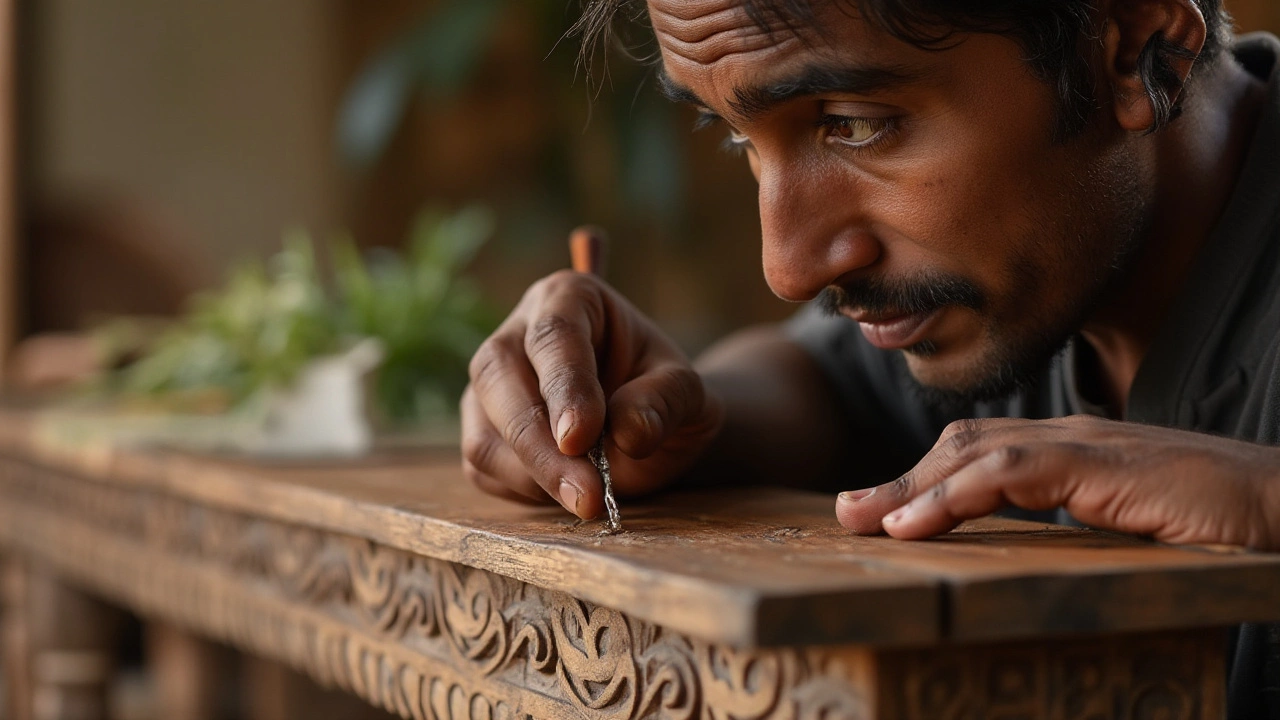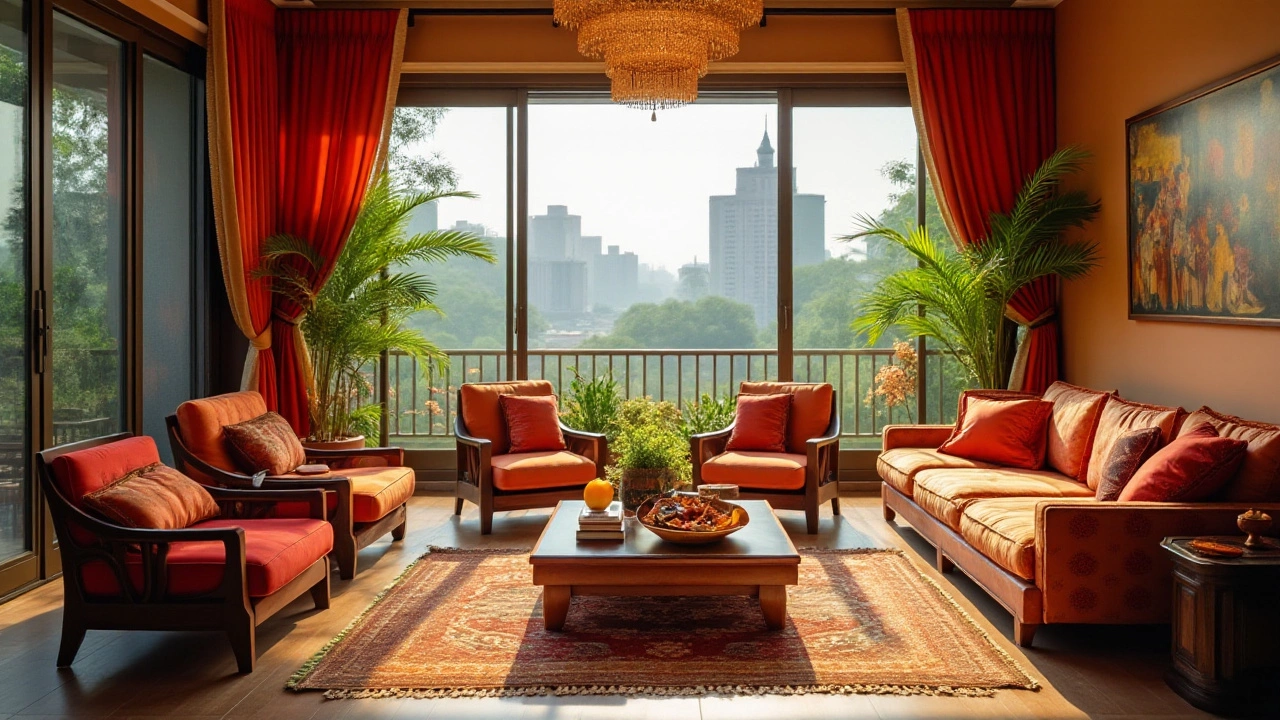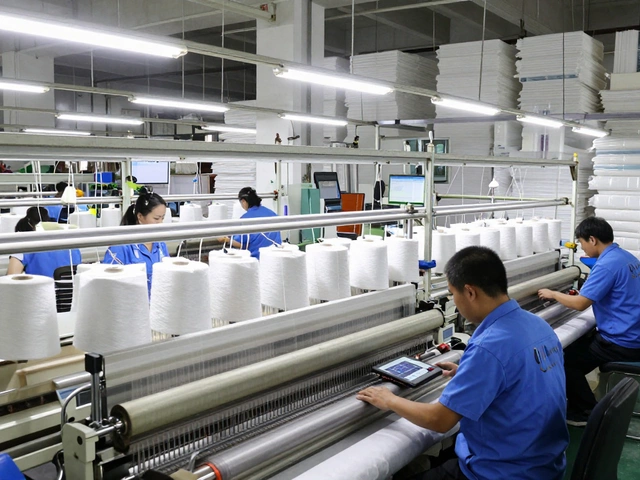Profit Potential of the Indian Furniture Industry

The Indian furniture market, long cherished for its craftsmanship and artistic touch, has transcended its traditional roots to embrace modernity. This industry, once dominated by handcrafted pieces, is now seeing a growing demand for functional and contemporary designs. With urbanization on the rise and discretionary incomes increasing, the appetite for unique and quality furniture continues to swell.
The potential for profitability in this sector is vast, but it comes with its share of challenges. Understanding the local consumer, tapping into the burgeoning middle class, and embracing sustainability are essential strategies for success. As the market becomes more competitive, it's crucial for both new entrants and established players to innovate and adapt continually.
- Understanding the Indian Furniture Market
- Opportunities for Local Artisans and Businesses
- Challenges and Market Dynamics
- Tips for Successfully Entering the Furniture Industry
Understanding the Indian Furniture Market
The Indian furniture market has been witnessing a dynamic transformation over the past few years. Traditionally known for its intricate woodwork and artisanal touch, this market is now embracing modernity. A significant driver of this shift is the growing middle class with increasing disposable income. As urbanization spreads like wildfire across the country, people are moving to cities looking for better opportunities, which directly boosts the demand for stylish and space-efficient furniture. The rise of nuclear families has also accelerated this trend. With limited living spaces, there's a desire for pieces that are both functional and aesthetically pleasing.
The market growth is supported by the vibrant startup scene in India, offering innovative solutions and e-commerce ventures, enabling easier access to varied furniture options. As per industry reports, the Indian furniture market was valued at approximately USD 32 billion in 2020 and is projected to grow at a compound annual growth rate (CAGR) of about 12% over the next five years. This promising growth is largely fueled by both domestic consumption and international exports. In exploring this evolving sector, it’s enlightening to consider the words of Amit Goyal, CEO of a leading furniture manufacturing company, who remarked,
"Our tradition of craftsmanship combined with present-day innovation positions India uniquely in the global furniture industry."This quote exemplifies the balance between heritage and futuristic design that is propelling the market forward.
The furniture industry in India also benefits from abundant raw materials and a skilled workforce, which positions the country as a competitive hub for manufacturing. The government has introduced several initiatives aimed at promoting this sector, including the Make in India campaign, which emphasizes increasing manufacturing output and boosting Indian-made products in global markets. However, the market isn't without its challenges. The unorganized sector, predominated by small players with traditional methods, still holds a significant share. This segment faces difficulties in scaling operations and meeting the rising demands for quality and timely delivery.
Additionally, preferences for sustainable and eco-friendly furniture are making waves, motivating manufacturers to adopt greener practices by using recycled materials and reducing wastage. Certifications such as the Forest Stewardship Council (FSC) play a pivotal role here, ensuring the responsible sourcing of wood. Given the rapid evolution in consumer preferences, manufacturers are compelled to adapt to these changing expectations swiftly. It is clear that understanding the dynamics of the Indian furniture market involves recognizing these multifaceted pressures, opportunities, and the landscape of competition. Embracing new technologies like digital printing or smart furniture for the tech-savvy millennial demographic could potentially carve out a niche for forward-looking businesses.

Opportunities for Local Artisans and Businesses
The furniture business in India offers local artisans and small-scale businesses a unique platform to showcase their skills and traditional craftsmanship on a potentially global stage. It is a vibrant tapestry of various styles, each carrying its own history and cultural significance. As trends lean toward sustainable and ethical consumerism, there is a burgeoning market for eco-friendly and handmade furniture that artisans can capitalize on. This demand for sustainable options is not just a trend but a significant shift in consumer preferences, especially among the younger demographic who prioritize ethical practices over mere aesthetics.
With the rise of digital marketplaces, artisans can reach customers far beyond their local borders. Platforms such as Amazon, Flipkart, and smaller niche websites dedicated to Indian furniture make it easier for artisans to market their products. These platforms operate with the dual benefit of showcasing unique items and providing the artisans with access to secure payment and reliable logistics, both of which are critical for scaling a small business successfully. Adding to these dynamics, government initiatives aimed at boosting the manufacturing sector and supporting MSMEs (Micro, Small, and Medium Enterprises) have further simplified procedures and provided better financing options. More digital literacy and the penetration of internet services into rural areas mean many artisans are embracing e-commerce, giving them unprecedented access to global markets.
Investing in skills development is equally pivotal. With the support of various skill development programs, there is a movement towards training young artisans in both traditional techniques and modern design methodologies, ensuring the sector's evolution without losing its rich heritage. For instance, collaborative efforts between designers and local craftsmen have resulted in innovative products that merge traditional aesthetics with contemporary functionality. Such partnerships allow for the introduction of fresh ideas while leveraging the timeless appeal of classical Indian craftsmanship, meeting the demands of a diverse customer base.
"The evolving demands for customized and ethical furniture are pushing boundaries and calling on artisans to adapt while maintaining the essence of their age-old traditions," remarked Anil Mathur, CEO of a prominent Indian furniture brand. His insight highlights the delicate balance that must be struck to drive success in this sector.
International markets also present substantial opportunities. The unique craftsmanship of Indian artisans attracts buyers from all over the world who are looking for furniture with character and soul, unlike mass-produced items. Exporting these goods can boost revenues significantly, provided artisans can effectively navigate the complexities of international trade. Developing strategic partnerships with overseas retailers is vital to tapping into this demand. Moreover, attending international trade fairs and exhibitions can dramatically increase visibility, helping to establish strong networks and facilitate cross-border business deals.

Challenges and Market Dynamics
The Indian furniture business is at a crossroads, blending traditional artistry with modern production techniques, but it's not without its hurdles. One significant challenge is the competition from both domestic players and international brands. As global giants enter the India market, local manufacturers are under pressure to innovate and maintain their artistry while also producing at scale. The cost of production and raw materials, often unstable, adds another layer of complexity, influencing pricing strategies and profit margins.
Additionally, the logistical intricacies of distribution across such a vast geographical landscape pose significant challenges. Setting up an efficient supply chain in regions with limited infrastructure can be daunting. Retail space in urban areas commands a premium, yet it's crucial for brand visibility and market penetration. This necessitates creative retail approaches, such as leveraging e-commerce platforms and pop-up stores, to reach the tech-savvy consumer base who value convenience alongside design.
Moreover, consumer preferences are rapidly shifting towards sustainable and eco-friendly products. The younger demographic, in particular, increasingly considers the environmental impact of their purchases. Manufacturers need to adapt by sourcing sustainable materials and adopting eco-friendly processes. A report by BCG highlighted that the Indian consumer market is on the rise with increased spending on home décor, yet cautioned that environmental consciousness will become a decisive factor.
The volatile nature of consumer demand means that businesses must stay nimble, responsive, and innovative. The ability to customize and offer unique solutions, whether through bespoke furniture designs or flexible product ranges, is becoming increasingly important. Additionally, the burgeoning importance of digital presence and marketing in this digital age can't be understated. Brands need to craft engaging online experiences that resonate with their target audience while maintaining a consistent offline presence.
Despite these challenges, there lies a silver lining in the form of a growing middle class that aspires to own aesthetically pleasing and functional spaces. Market dynamics, while unpredictable, also bring fresh opportunities for those willing to adapt. Collaborations between local artisans and large corporations, for instance, could blend tradition with industrial efficiency, setting new benchmarks in quality and design.

Tips for Successfully Entering the Furniture Industry
When embarking on a journey into the furniture business in India, a keen understanding of the industry's intricacies can be the difference between success and struggle. India, with its diverse culture and rapidly modernizing society, offers both unique challenges and exciting opportunities for entrepreneurial spirits. A well-thought-out strategy that includes research, adaptability, and consumer focus is essential for thriving in this competitive market.
First, a comprehensive market research is absolutely pivotal. Understanding the preferences and spending behaviors of Indian customers can guide you in choosing the right products. For instance, millennials are increasingly leaning towards minimalism, seeking furniture that is both stylish and functional. This shift opens new avenues, calling for designs that are not just appealing but also space-saving and versatile. Keeping a finger on the pulse of trends through social media, surveys, and customer feedback can keep your business agile and relevant.
Engaging with local artisans can provide a substantial edge too. Indian craftsmanship is revered globally, and integrating traditional designs with modern aesthetics can create a unique selling proposition. Moreover, it helps in promoting inclusive growth, offering artisans a sustainable livelihood while enriching your product portfolio with unparalleled authenticity.
Embrace Sustainability
Adopting sustainable practices is no longer optional but a necessity. Consumers today are environmentally conscious, making eco-friendly furniture a growing segment. Material sourcing is key; choosing sustainably harvested wood or recycled materials not only enhances your brand image but also potentially reduces costs. Additionally, consider energy-efficient manufacturing processes to further cement your commitment to sustainability. As Mahatma Gandhi eloquently put it,
"The Earth provides enough to satisfy every man's needs, but not every man's greed."This wisdom resonates deeply with modern sustainability efforts.
Building a robust supply chain is vital too. As part of the enterprising into the Indian market, identifying and establishing connections with dependable suppliers ensures material quality and supply consistency, which in turn, affects production schedules and customer satisfaction. Investing in technology can streamline operations, reduce errors, and lead to enhanced productivity.
Furthermore, an effective online presence can amplify your reach across India’s expansive geography. With the penetration of the internet and smartphones, e-commerce platforms offer significant potential. Creating a strong digital strategy, encompassing a visually appealing website, active social media profiles, and customer-centric online services, can foster brand loyalty and expand market share.
Lastly, it is crucial to abide by industry regulations and labor laws, focusing on ethical business practices. The furniture industry in India is subject to various standards related to safety and labor conditions. Ensuring compliance not only safeguards your business from legal hassles but also positively impacts the brand's reputation in a market that values responsibility.


